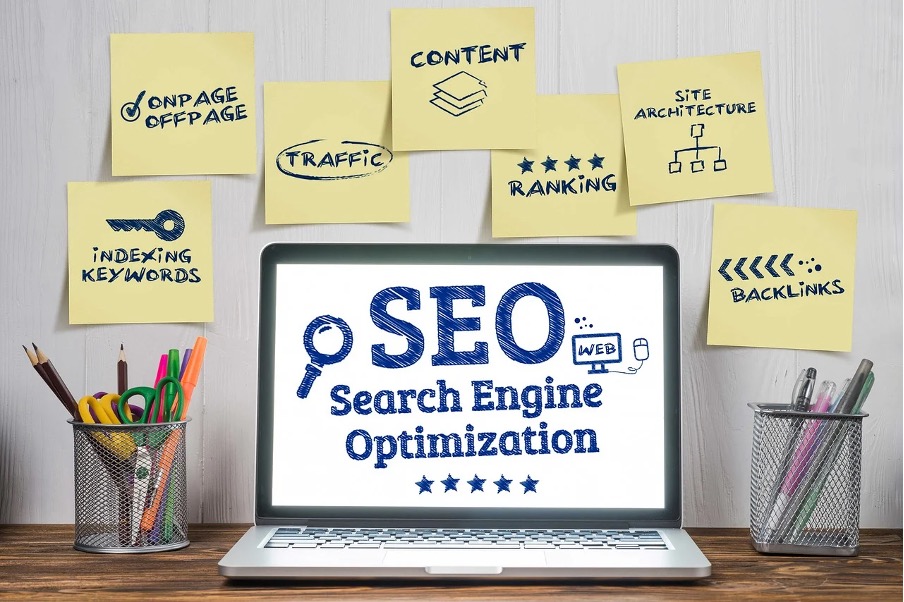In today’s competitive digital landscape, speed matters. Want proof? It’s already a widely-accepted fact that Google favors websites that load fast. This is without mentioning that in a 2015 Google study it was revealed that desktop users now expect websites to load in under two seconds — any slower, and they’ll move on without hesitation.
To build your online presence and ensure you don’t fall down Google’s search engine results page (SERP) due to slow page speeds, you’ll need to ensure every aspect of your site is fine-tuned for speed and reliability.
Luckily, there are many strategies you can implement to make sure your site loads fast and ranks high. In this blog post we will explore the importance of having a fast website, as well as provide some valuable tips on how you can improve your site speed without having to hire an expensive team of specialists.

How does website speed affect SEO?
The speed of your website directly impacts the amount of attention your content receives, regardless of its impact on SEO. For example, a study of more than 500 consumers in the US found that the average attention span for a website is only about 17 seconds. If your page is constantly stuttering and dragging its heels, it’s likely that your audience is going to find something else to do (and fast!).
However, the speed of your website doesn’t just affect the engagement levels of your audience, it also affects the likeliness of your site attracting an audience in the first place. This is because Google’s algorithm is designed specifically to favor pages that load faster.
If your website is plagued by slow load speeds, it’s highly unlikely to beat the competition on Google’s results page. This is all down to Google’s complex search index algorithm, the inner workings of which are a closely guarded secret. To make matters worse, the algorithm is updated hundreds of times every year, and so nobody is certain on how it’s used to assess a site’s ranking. However, it’s a widely-accepted fact that load speed is taken into account by the algorithm, and so you’ll want to make sure that your site loads as quickly as possible.
Whether you’re an SEO whizzkid or you’re less familiar with how search engines dictate rankings, it’s crucial to understand that improving your website’s performance is one of the simplest and most effective ways to get it seen more frequently. Fine-tune your website for speed and Google should display your web page higher up in its search results pages. It’s a simple equation, but it’s one that many business owners fail to realize.
How to improve your website’s load speed
Here’s the bottom line: if your website is a little sluggish, you can expect it to appear further down the search engine results page. How important is your search engine ranking? Put it this way — when was the last time you visited page two on Google?
How can you improve this, then? A website can be enhanced in a number of ways, but one of the most effective is to look at your web hosting company. It may be time to upgrade your website’s hosting if it’s been in place for a while — hosting services have improved dramatically over the past decade, and even within the last five years.
If you do decide to migrate your website to a new host it's best to base your selection on their individual features and selling points, as many providers focus on different areas. Be careful when making your selection. Plenty of providers may claim to have the fastest hosting for Wordpress, for example, but the only way to know for sure is to do your research. Search for the hosting solution that matches your needs. If you’re looking for help with picking the best host, Themeisle has a great list of up-to-date reviews for some of the most popular providers.
Is there anything else you can do to improve your site’s speed?
Outside of upgrading your hosting, let’s discuss the other ways in which you can make your site as speedy as possible. There are a number of strategies you can implement, many of which we’ve listed below:
- If you’re using Wordpress, make sure it’s fully upgraded: While the default WordPress installation is sufficient for most sites, it is possible to improve your website’s loading speed further by upgrading to the latest version.
- Minimize images: Images take longer to load than text or other elements on your page, so you should try to minimize the number of images you use on your site. Additionally you can use a service like Squoosh to compress any of the existing images on your website.
- Install a caching plugin: Some caching plugins can reduce the load time of your site by serving up content from your server’s memory instead of from the hard drive.
- Leverage JavaScript: As scripts are one of the very first elements of your website that will load when a user opens it, they can have a significant impact on page speed.
- Optimize your code: Most web browsers will render a page faster if it has been coded using HTML5 and CSS3 standard.
- Make use of a performance management software: A performance management system can help you identify and resolve issues that are impeding your site’s loading speed.
- Improve site architecture: If your site architecture is causing bottlenecks, you can reduce your site’s loading time by restructuring your content so that it can be easily accessed by Google’s crawler bots.
- Check your redirects: Redirects are one of the most common causes of slow loading pages. Make sure that they are pointing where they should be pointing and are not causing unnecessary bottlenecks.
- Minimize AJAX requests: Asynchronous JavaScript and AJAX (also known as “Asynchronicity”) requests bring your page to the front and allow Google’s bots to access your content, but they also take longer to load than synchronous requests that are initiated by the browser.
- Make use of a CDN: A Content Delivery Network (CDN) is a network of servers located around the world that help to rapidly deliver your site’s content to users. Some hosting providers include baked-in Cloudflare integration as standard.
My website is up to speed — what now?
Your website’s speed is only one piece of the puzzle — SEO is an incredibly deep topic, but there’s only so much we can cover in one article. With that in mind, take a look at these extra SEO tips that you can use to help improve your search engine ranking.
Keywords and keyword research
Keywords are the words and phrases that your customers are using to search for products or services similar to the ones you provide. It is important that your website has the right keywords in order to optimize it for better search engine ranking.
In the most basic terms, keyword research is the process of discovering exactly which keywords your potential customers are using to search for products or services similar to yours. For example, if you’re running a plumbing service, you can use a keyword research tool like Ahrefs to find out which words your potential customers are using when searching for local plumbers. These may be search terms such as ‘affordable plumbers near me’ or ‘local plumber nearby’. Once you’ve collected these keywords and terms, you can use them in your own website’s content to optimize it for better search engine ranking. Google’s crawler bots will recognise your site as being relevant to the same terms your potential customers are searching for, therefore pushing your website higher up Google’s results pages. This is one of the reasons why many business pages also have their own blog. Generate 100s of relevant keyword with our Long tail Keyword Generator.
Content marketing strategy
Creating content that is both relevant and useful to your customers is an important part of any online marketing strategy. When you create high-quality content that engages your audience, you are also helping to improve your SEO. The more engaging your content is, the more time customers will spend on your site (which will signal to search engines that your site is highly valuable) and the more likely your content will be shared on social media. This can bring more traffic to your website and, in turn, boost your SEO. When creating your content, you should make sure that it is relevant, valuable, and engaging.
For more information on SEO, why not visit our guide on how to become an SEO expert? If you’re operating on a low budget, we can also recommend our post on low-budget SEO, too.
Conclusion
In today’s digital landscape, it’s a fact that Google favors websites that load quickly. To build your online presence and ensure you don’t lose out on organic search engine results due to slow page speeds, it’s best to build a website that loads swiftly (or modify your existing site to ensure it does).
By using the tips above, you should begin to see your site rise up the search engine results pages. It’s also a good idea to actively monitor your SEO performance; rankings can change weekly, so you’ll need to keep a close eye on the competition!
leave a comment
Please post your comments here.SEARCH
-
Popular SEO Tools
- Paraphrasing Tool
- Plagiarism Checker
- Article Spinner / Rewriter
- Keyword Position Checker
- Grammar Check
- Domain Authority Checker
- Pagespeed Insights Checker
- Reverse Image Search
- Page Authority checker
- Backlink Checker
- Alexa Rank Checker
- Backlink Maker
- Domain Age Checker
- Website Ping Tool
- Website Seo Score Checker
- Keyword Density Checker
- Website Page Size Checker
- Word Count Checker
- Mozrank Checker

 ™
™